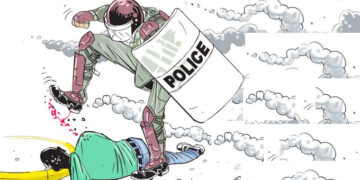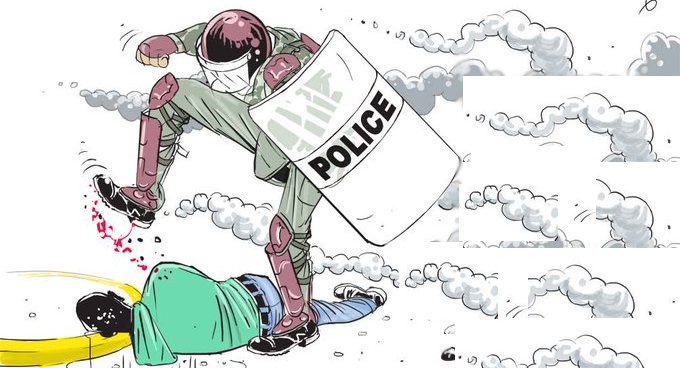Major human rights groups are again urging full probes into the fatal shootings of protesters by Kenya security officers during June protests over higher taxes.
The fresh appeal comes after a BBC Africa Eye documentary that named security personnel who opened fire and killed three demonstrators at the national parliament, sparking public anger and louder cries for justice.
Amnesty International and the Kenya Human Rights Commission said the officers singled out in the documentary must answer in court and be held to the law.
Kenya government spokesman Isaac Mwaura replied that every life matters, said the police oversight body is already probing the incidents, and accused the BBC production of offering a one sided story.
“Those who did the documentary should have sought government opinion… so that they can be fair and balanced,” Isaac Mwaura said.
“For example, they show the parliament being burnt, but they don’t show who is doing it; they seem to minimise the vandalisation that happened in parliament.”
He acknowledged that demonstrators raised valid points about the finance bill, yet warned, “We cannot have a country that also is led through anarchy and mayhem.”
The BBC had invited the government to contribute to the programme.
Kenya lawmakers debated the matter on Tuesday when MP John Kiarie charged the BBC with pushing a foreign agenda, whereas MP Millie Odhiambo urged officials to handle protest fallout soberly and avoid silencing the press.
“The BBC documentary has created more anger among young people… You can’t stop the media,” Odhiambo said.
Before the film went public, the national police said it could not examine its own actions and pointed to the Independent Policing Oversight Authority as the body that probes alleged misconduct.
Kenya Defence Forces informed the BBC that no request from IPOA had arrived to inspect the conduct of soldiers deployed at parliament.
The Blood Parliament episode by BBC Africa Eye showed security units using heavy force against young demonstrators who broke into the legislature on 25 June 2024, the same day lawmakers backed the tax increases.
The finance bill sought to raise two point seven billion dollars (two billion pounds) which the government said would lower dependence on overseas loans, but the plan stirred wide anger.
By reviewing open source material and more than five thousand images shared by the public, BBC analysts traced a uniformed policeman and a soldier who fired at parliament and killed three unarmed protesters.
A broader crackdown by security forces during weeks of finance bill protests left at least sixty five people dead, saw eighty nine disappear by force and led to thousands of arrests, Amnesty International reported.
The government gave a lower death toll of forty two.
On Monday the BBC announced it called off a private showing of the film in Nairobi after pressure from the authorities.
“We are very disappointed not to have been able to share the documentary and panel discussion as planned,” a BBC spokesperson said.
“In the meantime, audiences can watch the film on BBC Africa’s YouTube channel,” the spokesperson added.
Amnesty stated that the film confirmed its earlier findings that unnecessary and excessive lethal force had been used against protesters.
The organisation urged both police and army to publicly outline steps taken in light of the BBC exposé.
The rights body asked Kenyans to sign a petition demanding a public inquiry into the deaths recorded during the OccupyParliament demonstrations.
KHRC argued the film showed that organised criminals wearing police and military uniforms had been sent to murder innocent Kenyans.
The group added that responsibility lay with President William Ruto, who should be held to account for the deaths.
Kenyans voiced anger on social media, urging the government to bring security officers to justice for killing and injuring peaceful demonstrators.
President Ruto has earlier defended police from brutality claims and lately cautioned citizens not to comment on military issues.
Police have consistently denied any role in the abductions and killings, and no officer has faced charges.
On Monday after the documentary aired, IPOA issued an update on its investigations.
The authority said that among sixty deaths under review forty one were due to gunshot wounds.
IPOA noted it had finished twenty two inquiries, was still handling thirty six others, and had already taken two cases to court.
The agency recorded two hundred thirty three injuries linked to the demonstrations.
The main opposition coalition wrote in a statement that the execution of peaceful protesters had been planned and approved at the highest levels.
Mr Mwaura warned the film could incite Kenyans to violence, and one lawmaker even urged a ban on the BBC in Kenya.
Legislator George Peter Kaluma argued that the thirty seven minute documentary threatened to destabilise the country.
However Senator Edwin Sifuna defended the film, stating it contained no fabrications.
“We must encourage these stories to be told from all angles for the sake of truth and justice. Those who are uncomfortable with this are wrestling with their own consciences and we cannot help them with that,” Sifuna posted on X.




































